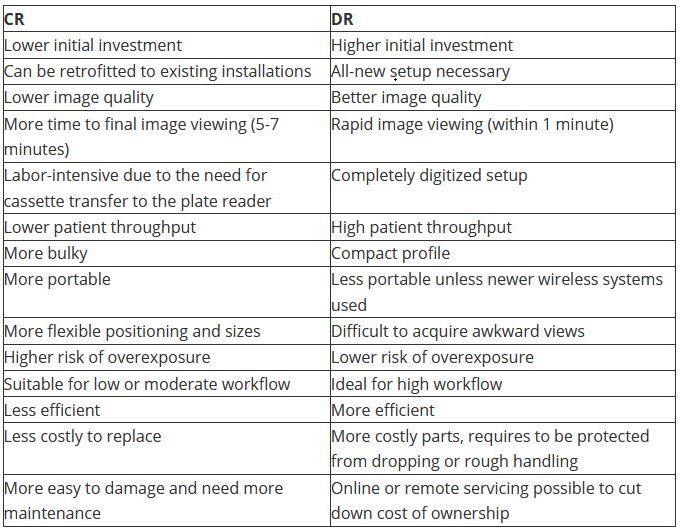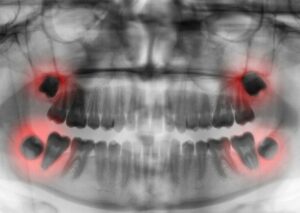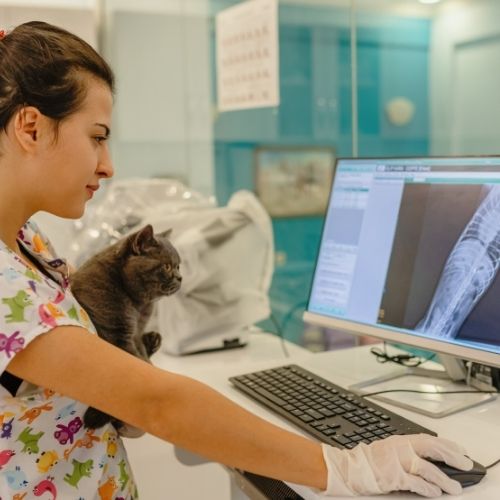Today’s article is dedicated to the most common X-Ray Technician Interview Questions. Below we listed the 10 most popular X-ray technician interview questions and answers. We hope that you will find this article useful! Let us know in the comments below which questions were the most helpful and share with others your experience from the X-ray technician job interview.
Good luck!

How to prepare for a first job interview – quick guide & checklist
Table of Contents
X-Ray Technician interview questions
Why did you choose to become an X-ray technician?
This is definitely one of the most frequently asked X-ray technician interview questions.
Radiology is based on the internal human body – how it looks, how it functions, what organs make the human body up, how they depend on each other, etc. This is what fascinated me first. I like to analyze the X-ray images, focus on the details and search for anomalies, and the possible root cause of a patient’s health problems. I am happy each time when I can help doctors to make a proper diagnosis, choose the course of treatment and, by that, speed up a patient’s recovery.
How to answer the “Tell me about yourself” question in a job interview?
What skills are the most important for an X-ray technician?
A question related to the skills will be probably one of the first X-ray technician interview questions which you will be asked. Similar to all other medical professions, X-ray technicians must have an inner willingness and readiness to help others, excellent communication and interpersonal skills, patience, empathy, accuracy, and attention to detail.
Technical, medical skills, and anatomy knowledge are also necessary, but they are not enough to provide quality patient care.
What are the advantages of X-rays?
When it comes to the technical, medical questions that may occur during an X-ray technician job interview, the questions about the advantages and the disadvantages of X-radiation are the most frequent. Below you can find the main pros of X-rays:
- Noninvasive
- Painless
- Relatively safe for both patients and technicians
- Provide quite accurate results
- Allow immediate diagnosis
- Help to avoid surgeries
- Relatively cheap
What are the disadvantages of X-rays?
As an X-ray technician, you should be also aware of the different disadvantages and risks related to X-radiation, such as:
- Bones absorb X-radiation and, in consequence, decrease data accuracy
- Increased risk of cancer
- Increased risk of different tissue effects (skin reddening, hair loss, cataracts, etc.)
- Medium quality image
What are the differences between CR and DR?
There are 2 main digital radiology systems: CR (which stands for Computed Radiography) and DR (which stands for Digital Radiography).
To capture X-ray images, the CR cassettes use photo-stimulated luminescence screens. Once it is done, a special reader converts the image into a digital format. When it comes to DR systems, they use flat panels with detectors. DR X-ray image is converted into a digital format in real-time and, in a couple of seconds, is already available for review and description.
Check the table below to see more differences between CR and DR.

Source: www.news-medical.net
What are the main contradictions for an X-ray?
This is also one of the X-ray technician interview questions to expect.
There are no absolute contradictions for an X-ray that could disqualify a patient in a life-threatening situation but, in some cases, in for needed, X-rays should be avoided (or postponed). It applies to:
- Pregnancy (confirmed pregnancy, possible pregnancy, pregnancy planning)
- Asthma
- Allergies (hay fever, etc.)
From your experience as an X-ray technician, what is the best way to keep your patients’ repository data?
I like to maintain patients’ repository data in MS Excel or MS Access files. These two file types are just perfect to keep patients’ records. They are easy to use, intuitive, reliable and, in consequence, they significantly reduce the administration time during consultations.

How would you handle a difficult patient?
Stress and arguments harm patients’ medical conditions and a medical personnel focus. Patients are usually much more stressed than the medical personnel, so from my side, I would try to calm the patient down and de-escalate the situation. I would start by listening to what a patient wants to say, trying to understand his/her concerns, his/her point of view, search for a solution or, at least, a compromise. If none of these helps, I would try to find a mediator (for example, a psychologist) and finally, if there is no other option, I would hand over a patient to another colleague.
How would you calm down a panicking patient?
This is one of the most popular behavioral (scenario-based) X-ray technician interview questions.
I would start by telling this patient the pros and cons of an X-ray. Secondly, I will try to make him/ her as comfortable as possible. Crowd, rush, etc. may additionally increase patient’s fear and anxiety. Finally, I would be showing him/her some examples of X-ray descriptions – seeing how much we can learn about the body and the injury thanks to an X-ray, how much it can help to make the correct diagnosis and direct the treatment, may help the patient to overcome his/her fear and get an X-ray done.
What would you do if a patient strongly refuses to have an X-ray even though he/she is suffering from pain and without an X-ray a further diagnosis is impossible?
In the first place, I would talk with this patient and try to understand why he/she does not agree with an X-ray. It is possible, that a patient has some contraindications which I am not aware of (pregnancy, trauma, etc.). If it turns out that a patient is scared of the side effects, I would present him/her the main benefits and risks of an X-ray and all the precautions in place that secure the patient’s safety (recommended maximum frequency of the exposure, etc.).
If a patient still refuses to take an X-ray, I will need to accept his/her decision, inform them about the consequences for the medical condition and further treatment, and, finally, I would remind them that he/she can always change the decision. Later is better than never.
How to answer the “Do you have any questions for us” question in a job interview?
This was the last of 10 X-ray technician interview questions which we prepared for you today.
X-ray technician salary
According to glassdoor.com, X-ray technicians in the United States can count on an average salary of around $54k/year. Salary ranges start from around $37k/year, while the luckiest ones can get even up to $80k/year.
When it comes to veterinary radiology technicians, their salaries are slightly lower. According to payscale.com, veterinary radiology technicians earn on average $39k/year ($29k/year – $49k/year).

Share with us your X-ray technician job interview experience in the comments section below.
If you liked this article, don’t forget to leave a thumb up! Thanks!
Would have preferred this in PDF form.